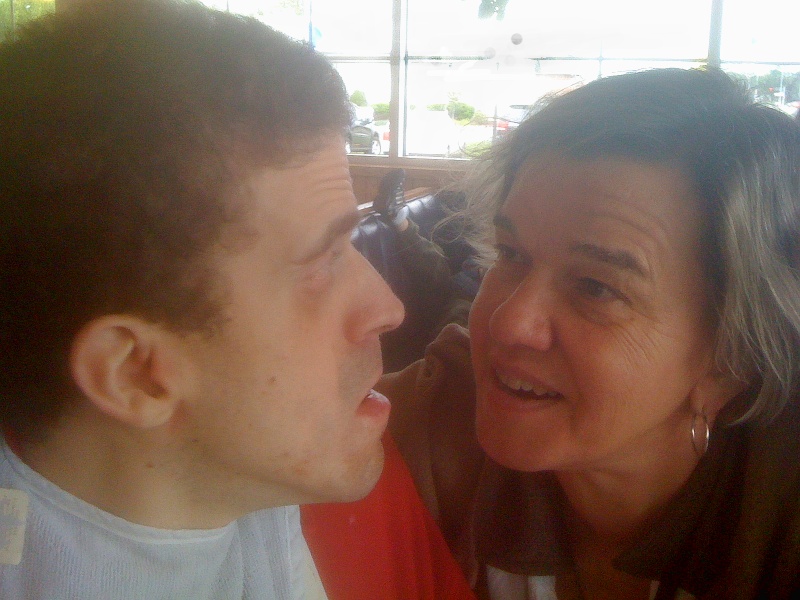
Here's the view out our window of set-up day for Printers Row Lit Fest
Poor Harper! He came home from the Seeing Eye to piles of snow here in Chicago and for weeks — even months — after the snow finally melted, it rained. Harper braved the thunder and learned to maneuver us around puddles, and when the sun finally made its debut last Monday I’m sure he thought he was on easy street. But that’s when the semi-trucks arrived.
This weekend is Printers Row Lit Fest, and the semis were loaded with huge tent poles, panels upon panels of tarps, reels of cables and wires and everything else it takes to convert our little neighborhood into a bookworm Bacchanalia. Streets and parking lots close, huge tents spring up in the middle of streets, sidewalks up and down our block are overtaken by hundreds of exhibitors: booksellers, publishers, and literary organizations. Threading me through a sea of book nerds rushing from one author panel to the next is not going to be easy for dear Harper, but today’s guest blog gives me confidence that he’s up to the challenge.
Longtime Chicago Blackhawk fans will understand how guest blogger Michael Vasko got pegged with the nickname “Elmer” in college. ElmerMichael and his wife Donna moved to Arizona after we all graduated from the University of Illinois, and they were nice enough to come to the Phoenix Public Library when Hanni and I did a presentation there.
That’s when I found out that he and I share something besides our nostalgia for Scott Hall parties: ElmerMichael likes to write, too. He’s completed a couple of novels, and he was motivated to write a short piece after reading my blog posts about some of the troubles I’d been having with Harper. “For some reason, right from the start, I was identifying with Harper,” he said. “Newly graduated, thrown out into the real world and it now being time to shine. It resonated.”
Trying Too Hard
by Michael Vasko
So I’m cruising the internet and come across this story about a girl who had hung around exclusively with only other girls up to now but suddenly found herself out with a boy. For the first time. And how the two of them would go out, but how often times the girl couldn’t help but notice the boy acting unlike those before him. She could tell he liked her, but often times he would wind up doing the wrong thing. Often the socially unacceptable thing. But my god, he was cute so the girl would overlook it. But there came a point where she could no longer continue to overlook his little proclivities. She didn’t really want to break up; but come on, get with it, the girl would think.
So the story goes on to say how the girl wondered why the boy acted the way he did; to the point of asking her friends and even delving into the boy’s past. All in an effort to try to learn why her relationship was so different this time. From all her other past relationships. And this effort goes on for some time. And all the while I’m sitting at my desk, reading this story, thinking to myself that I know the answer: HE’S A GUY!
To me, I’m reading a story of a guy out with a girl – and it’s his very first girl at that. And he likes her a lot, and can pretty well tell she likes him too. But then again, what does he really know? He’s new at this. So he’s thinking, I’m pretty sure she likes me, so let’s not screw this up. And so they go out one time, and at the end of their date she says she had a good time and all, but I don’t know, he’s thinking; I think I must have done something wrong. I’ve kinda got an ability to sense these things.
So now the guy gets nervous. And they make a date to go out again. But there’s nothing sadder than a young guy trying to take care of a girl out on a date who is nervous. Now I wasn’t there of course, but I’m reading this story imagining the details; imagining the guy slamming her dress in the car door and then getting all focused on that and forgetting to open the restaurant door for her. And probably making a mess of their actual meal together too. And the harder he would try, the worse things would get; to the point of him thinking that he wishes he had never even gone out with her in the first place.
So I’m reading this story and two thoughts keep going through my mind. The first is: I hope the girl doesn’t give up on this guy. Because of course at first the guy is gonna come off as something less than all those old friends the girl had previously. Because he’s a guy. We’re slow. And easily distracted. And you can tell us to do something and a minute later we’ve forgotten whatever it was you had just said. But it’s not from a lack of trying. If anything, it’s likely we look like goofs because we’re trying too hard. And we’re really not good at doing more than one thing at a time; and new things kind of throw us ’cause we don’t like looking like idiots, which of course guarantees us looking like idiots; and oh by the way, we have no freaking idea how your minds work. But given time, more than you and all those other women can ever guess, we always get there. And we’re always pretty sure we’re worth the wait.
And oh yeah, the second thought was something along the lines of it might help if, in the meantime, in order to help us ultimately get where you want us to be, you provide us with a seemingly unnaturally high level of treats, which has been known to help successfully influence and determine our behaviour.
Hoping for continued success with your new friend,
Michael




